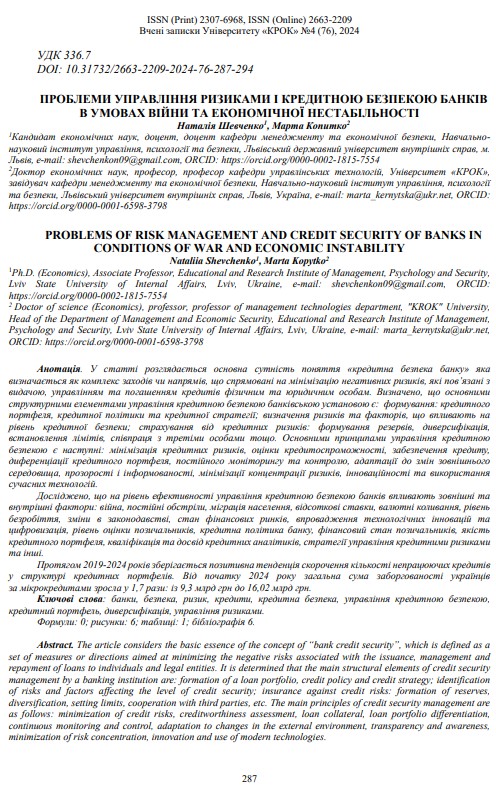ПРОБЛЕМИ УПРАВЛІННЯ РИЗИКАМИ І КРЕДИТНОЮ БЕЗПЕКОЮ БАНКІВ В УМОВАХ ВІЙНИ ТА ЕКОНОМІЧНОЇ НЕСТАБІЛЬНОСТІ
DOI:
https://doi.org/10.31732/2663-2209-2024-76-287-294Ключові слова:
банки, безпека, ризик, кредити, кредитна безпека, управління кредитною безпекою, кредитний портфель, диверсифікація, управління ризикамиАнотація
У статті розглядається основна сутність поняття «кредитна безпека банку» яка визначається як комплекс заходів чи напрямів, що спрямовані на мінімізацію негативних ризиків, які пов’язані з видачою, управлінням та погашенням кредитів фізичним та юридичним особам. Визначено, що основними структурними елементами управління кредитною безпекою банківською установою є: формування: кредитного портфеля, кредитної політики та кредитної стратегії; визначення ризиків та факторів, що впливають на рівень кредитної безпеки; страхування від кредитних ризиків: формування резервів, диверсифікація, встановлення лімітів, співпраця з третіми особами тощо. Основними принципами управління кредитною безпекою є наступні: мінімізація кредитних ризиків, оцінки кредитоспроможності, забезпечення кредиту, диференціації кредитного портфеля, постійного моніторингу та контролю, адаптації до змін зовнішнього середовища, прозорості і інформованості, мінімізації концентрації ризиків, інноваційності та використання сучасних технологій.
Досліджено, що на рівень ефективності управління кредитною безпекою банків впливають зовнішні та внутрішні фактори: війна, постійні обстріли, міграція населення, відсоткові ставки, валютні коливання, рівень безробіття, зміни в законодавстві, стан фінансових ринків, впровадження технологічних інновацій та цифровизація, рівень оцінки позичальників, кредитна політика банку, фінансовий стан позичальників, якість кредитного портфеля, кваліфікація та досвід кредитних аналітиків, стратегії управління кредитними ризиками та інші.
Протягом 2019-2024 років зберігається позитивна тенденція скорочення кількості непрацюючих кредитів у структурі кредитних портфелів. Від початку 2024 року загальна сума заборгованості українців за мікрокредитами зросла у 1,7 рази: із 9,3 млрд грн до 16,02 млрд грн.
Завантаження
Посилання
Барановський О. І. Банківська безпека: проблема виміру. Економіка і прогнозування. 2006. № 1. С. 7-25.
Коковіхіна, О. О., Високорода М. С. Фінансова безпека комерційного банку: подальше удосконалення визначення. Вісник економіки транспорту і промисловості. 2014. № 45. С. 253-256.
Биков В. «Кредитна» безпека, або як не потрапити в халепу, оформлюючи кредит. Банківське та фінансове право. № 10 (664). 2019. URL: https://yur-gazeta.com/publications/practice/bankivske-ta-finansove-pravo/kreditna-bezpeka-abo-yak-ne-potrapiti-v-halepu-oformlyuyuchi-kredit.html
Офіційна статистика фінансового сектору Національного банку України. Офіційний сайт. URL: https://bank.gov.ua/ua/statistic/supervision-statist
Опендатабот. Аналітика фінансових організацій. Офіційний сайт статистичних даних. URL: https://opendatabot.ua/analytics/mfo-2024-3
Пушак Я.Я., Шевченко Н.В. Особливості формування та управління ресурсами банків в сучасних умовах. Економічний Вісник Донбасу. Випуск 3 (69), 2022. С. 36-41
Mihus I., Koval Ya., Laptev S., Bala O., Kopytko M. Monitoring the state anti-crisis management of economic security of the Ukraine banking institutions. Business: Theory and Practice. 2020. 21(2). Рр. 804–812. https://doi.org/10.3846/btp.2020.12985
Kopytko M., Grabar N., Storozhuk O., Borutska Y., Doroshenko T. Influence of Negative Factors of War: Economic, Legal, Regional and Environmental Aspects. International Journal of Computer Science and Network Security. 2022. Vol. 22. No.6. pp. 13-18. https://doi.org/10.22937/IJCSNS.2022.22.6.3.
REFERENCES:
Baranovskij, O.I. (2006) “Banking security: the problem of measurement” Ekonomika i prognozuvannya. vol. 1, pp. 7-25.
Kokovihina, O.O., Visokoroda M.S. (2014) “Financial security of a commercial bank: further improvement of the definition”, Visnik ekonomiki transportu i promislovosti, vol. 45. pp. 253-256.
Bikov, V. (2019) “Credit” security, or how to avoid getting into trouble when taking out a loan”. Bankivske ta finansove pravo, vol. 10 (664). URL: https://yur-gazeta.com/publications/practice/bankivske-ta-finansove-pravo/kreditna-bezpeka-abo-yak-ne-potrapiti-v-halepu-oformlyuyuchi-kredit.html
Oficijna statistika finansovogo sektoru Nacionalnogo banku Ukrayini. Oficijnij sajt. URL: https://bank.gov.ua/ua/statistic/supervision-statist
Opendatabot. Analitika finansovih organizacij. Oficijnij sajt statistichnih danih. URL: https://opendatabot.ua/analytics/mfo-2024-3
Pushak, Ya.Ya., Shevchenko, N.V. (2022) “Peculiarities of formation and management of banks' resources in modern conditions” Ekonomichnij Visnik Donbasu, vol. 3 (69), pp. 36-41
Mihus I., Koval Ya., Laptev S., Bala O., Kopytko M. Monitoring the state anti-crisis management of economic security of the Ukraine banking institutions. Business: Theory and Practice. 2020. 21(2). Рр. 804–812. https://doi.org/10.3846/btp.2020.12985
Kopytko M., Grabar N., Storozhuk O., Borutska Y., Doroshenko T. Influence of Negative Factors of War: Economic, Legal, Regional and Environmental Aspects. International Journal of Computer Science and Network Security. 2022. Vol. 22. No.6. pp. 13-18. https://doi.org/10.22937/IJCSNS.2022.22.6.3.

Downloads
Опубліковано
Як цитувати
Номер
Розділ
Ліцензія

Ця робота ліцензується відповідно до Creative Commons Attribution-NonCommercial 4.0 International License.

